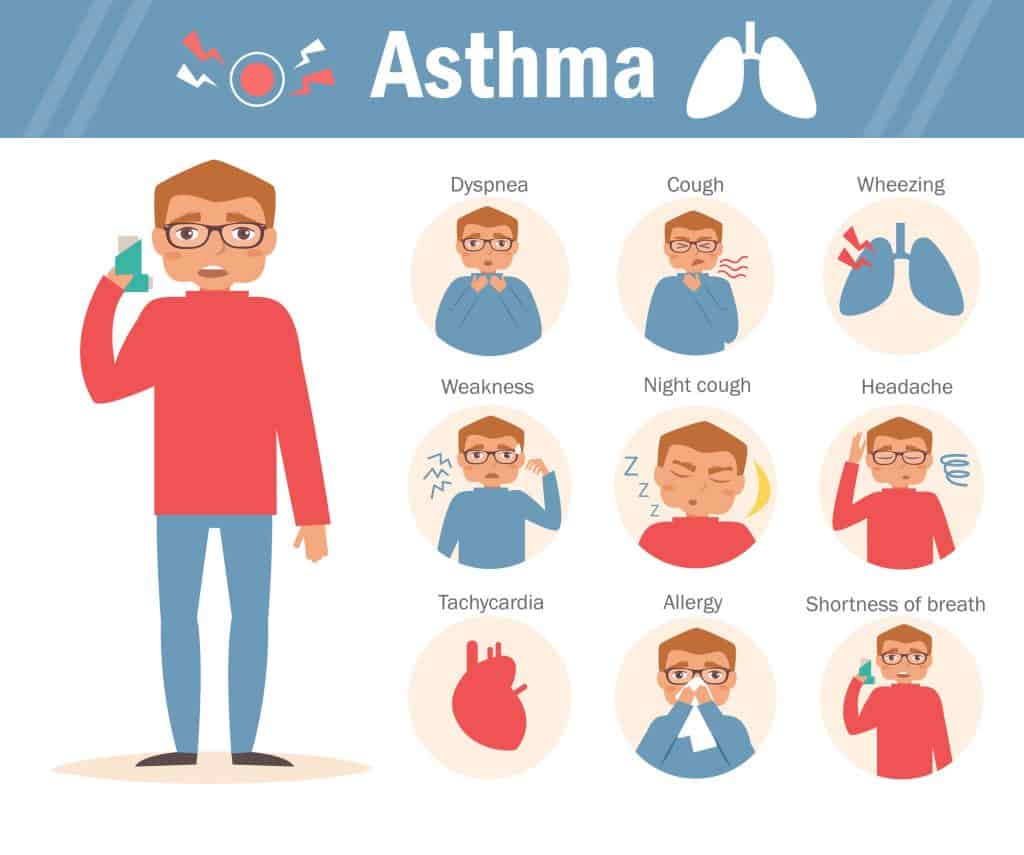Is Asthma Genetic? Parental Inheritance, Which Parent, Other Factors
Posted by Prescription Hope - See Editorial Guidelines (Last Updated On: Mon Mar 13 2023)
Genes are often blamed for a number of ailments, but this isn’t always the case. So, one question many individuals have is, is asthma genetic?
This article will cover whether or not asthma is genetic and other factors that need to be considered. Let’s start with the brief answer, then we’ll get into more details.
Is Asthma Genetic? Asthma has great potential for genetic inheritance by as much as 70%. But asthma is not caused by a single gene mutation. This means that asthma is a polygenic, multifactorial disorder, which does not depend on genes alone but several other factors. One of these is environmental factors.
That’s the short answer, and it can come as quite a surprise that genetic factors account for 70% of a person’s risk of developing asthma. But let’s get into some more of the details.

What is Asthma?

Let’s recap on what asthma is. Asthma is a common health problem around the world. It affects people of all genders and ages. According to the Center for Disease Control and Prevention (CDC), 7.7 percent of people go through asthmatic medical conditions in the USA alone.
In short, asthma is a chronic lung disease that causes inflammation in the airways. The inflammation causes your airways to swell and narrow down. This also results in extra mucus production.
As a result of this, an asthma patient finds difficulties in breathing or experiences shortness of breath. Asthma also triggers coughing and makes a whistling sound when breathing in and out.
If you’re not sure if this applied to you, then here’s how to tell if you need an inhaler.
Is Asthma Genetic? – Asthma and Genetics
While many studies are still being conducted to determine whether asthma is genetic or not, On average, asthma is considered a genetic medical condition. Some researchers describe it as a “highly heritable disease.”
One interpretation then is that this means a person is more likely to develop asthma if the family history has been experienced with such a medical condition.
Also, to provide a stronger standpoint, another study in 2014 reviewed the genetic influence of developing asthma.
The study concluded that genetic factors accounted for 70% of a person’s risk of developing asthma. In other words, this sums up that genes play a major role in deciding whether or not a person develops asthma.
Specificities in Asthma and Genetics
While asthma has a strong base with genetic inheritance, there are also certain specificities for asthma being genetic in the whole question of, is asthma genetic
While there could be plenty of specificities in asthma being genetic, below are some common specificities that favor whether or not asthma might be genetic.
Asthma Development and Stage in Life
If you develop asthma at a later stage in life – as an adult or senior, then genes play a lesser role.
This means that asthma types, such as adult-onset asthma and occupational asthma, have no real dependency or influence from genes, and is not genetic.
In other words, if you develop one of these two types of asthma, the chances of such an asthmatic condition being genetic are very thin.
This is also in line with the specificity that genetic asthma inheritance is favorable only if the related genetic relatives developed asthma at an earlier stage in life.
Meaning, if the relative who has a history of asthma developed the condition at an early stage in life, it can be normal for genetic inheritance and vice versa.
The Severity of Asthma from Genetic Background
If your genetic asthma background involves severely affected asthma patients, then the genetic inheritance of asthma is favorable and vice versa.
This means that if one or more of your relatives have records of severe asthmatic conditions, then you’re likely to develop asthma through the genes.

The Degree of Genetic Relatedness
The degree of genetic relatedness also influences the favorable genetic inheritance of asthma. Meaning, depending on how close you and the relative are with the asthma history, the genetic inheritance will vary.
The more closely related you are to the relative (with fewer generation gaps and more close blood relative), the more favorable you are for developing asthma through genetic inheritance.

This also means that children of asthmatic parents have a high probability of genetic asthma inheritance.
This is also why the recurrence risk of asthma in monozygotic twins is much higher than in dizygotic twins, highlighting the role of genetic relatedness.
Children of Mothers with Asthma
Regarding the Children of mothers who suffer or have suffered from asthma, these are considered favorable for genetic asthma inheritance.
If you take the scale of genetic asthma inheritance from a mother and a father who has asthma, children of a mother with asthma are three times more likely to develop asthma. In contrast, children of fathers with asthma are 2.5 times likely to develop the same condition.
Recurrence Risk of Asthma Depends on One or Both Parents
The recurrence risk of asthma, meaning the probability of asthma developing on and off through your life, depends on whether one or both your parents are asthmatic.
The recurrence risk of asthma with one affected parent is 25%, whereas if both of your parents are affected by asthma, the recurrence risk is 50%.
In simple terms, asthma’s recurrence risk is greater if both of your parents are affected by asthma than just one parent being affected by asthma.
Asthma is not caused by a Single Mutation
Asthma is not actually caused by just one gene mutation but is a polygenic multifactorial disorder. Although asthma has great potential for genetic inheritance, it is not a result of a single mutation in one gene.
Therefore, many factors contribute to the onset of asthma.
Other Factors
Though asthma can largely be due to hereditary factors, there are other potential causes.
Some of the factors that could potentially cause asthma are debatable. However, one of the highly held factors contributing to the development of asthma, alongside genes, is environmental factors.
Environmental Factors

One best example of such an indication is that the prevalence and development of asthma in the western population is 20%. On the other hand, developing countries exhibit a lower prevalence of individuals suffering from asthma.
Different parts of the world are exposed to different environmental factors that may or may not favor the development of asthma.
For example, rural or less industrialized countries are exposed to less air pollution and vice versa. And each person’s body will react differently to the environmental factors surrounding them.
This shows that there’s a certain percentage of the role environmental factors play for the development of asthma other than mere genes.
It can be said that asthma certainly has genetic components for an inheritance, which takes up a major cause for the development of asthma. But it should also be said that it depends on several other factors too, including certain environmentally related factors.
Some of the other common factors that influence the development of asthma include the following:
- Allergies
- Premature Birth
- Lung Infections
- Occupational Exposures
- Hormones
- Environment Air Quality
- Obesity
On the subject of asthma, find out more in our other article about asthma and exercise.

Final Thoughts
We hope this has provided valuable insight into the question of is asthma genetic.
If you’re concerned in any way, then you should consult your doctor for further information and advice. Our program helps with a range of different inhalers to tackle all severities of asthma.
For more questions regarding your specific condition, always consult your healthcare provider.
If you’re having trouble affording any of the medications you’ve been prescribed, visit our home page to learn more about Prescription Hope’s medication access service, compare the costs of your current prescriptions, and see how we can help obtain your medications at a cheaper price. Fill out an application today and start receiving Brand-Name prescription medications at your doorstep. Call us at 1-877-296-HOPE (4673) to speak to one of our representatives, we’re always happy to see how we can help.
ENROLL



